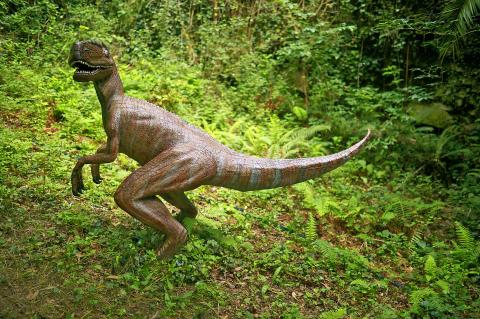Dinosaurs might have survived the catastrophic impact that ended their reign had the devastating asteroid that slammed into the Earth arrived at a “more convenient time,” a scientist has claimed. As a result humans would probably not exist.
The violent collision 66 million years ago, which occurred in the area that is now Mexico, triggered tsunamis across the oceans, caused powerful earthquakes and released enough heat to start many fires.
Material thrown into the air descended as acid rain, and also blocked the sun’s warmth, cooling the Earth temporarily, perhaps by tens of degrees Celsius.

Photo: Reuters
A thick blanket of dust that was thrown up darkened the globe.
The devastation wrought by the impact almost certainly explains the sudden death of the land-based dinosaurs, according to fresh analysis of the latest data.
However, one scientist on the team said the beasts might have prevailed had the asteroid struck earlier or later than it did.
Steve Brusatte, a paleontologist at Edinburgh University, was in an international team of researchers who reviewed the evidence on dinosaur extinction.
The group looked at work done on prehistoric climate and temperatures, changes in sea levels, volcanic activity and biodiversity, before reaching a consensus that the asteroid was the prime culprit.
“The asteroid almost certainly did it, but it just so happened to hit at a bad time when dinosaur ecosystems had been weakened by a loss of diversity,” Brusatte said. “If the asteroid had hit a few million years earlier, or a few million years later, then dinosaurs probably wouldn’t have gone extinct.”
The scientists’ report, published in Biological Reviews, found that while, largely, the dinosaurs were faring well at the time of the asteroid impact, the big plant-eating types, including the horned triceratops and duck-billed dinosaurs, had suffered a loss of biodiversity. There were fewer animals at the bottom of the food chain.
“The decline made those ecosystems at the very end of the Cretaceous [period], when the asteroid hit, considerably more vulnerable to collapse than those ecosystems that existed even a few million years before,” Brusatte said.
Dinosaur biodiversity rose and fell throughout their time on Earth over 150 million years.
Brusatte said he suspected that given a few million years more the large plant-eaters would have recovered, making the ecosystem more robust.
The asteroid, which was about 9.65km across, struck the Yucatan Peninsula and left a crater, the Chicxulub, measuring 19km deep by 199.5km wide.
The collision wiped out about 80 percent of the Earth’s species, though some dinosaurs survived to become the direct ancestors of birds.
“If the asteroid didn’t hit, I have no reason to believe they’d have gone extinct. And if dinosaurs didn’t go extinct, then mammals would have never had their opportunity to blossom. So if it wasn’t for that asteroid, then humans probably wouldn’t be here,” Brusatte said.

With much pomp and circumstance, Cairo is today to inaugurate the long-awaited Grand Egyptian Museum (GEM), widely presented as the crowning jewel on authorities’ efforts to overhaul the country’s vital tourism industry. With a panoramic view of the Giza pyramids plateau, the museum houses thousands of artifacts spanning more than 5,000 years of Egyptian antiquity at a whopping cost of more than US$1 billion. More than two decades in the making, the ultra-modern museum anticipates 5 million visitors annually, with never-before-seen relics on display. In the run-up to the grand opening, Egyptian media and official statements have hailed the “historic moment,” describing the

‘CHILD PORNOGRAPHY’: The doll on Shein’s Web site measure about 80cm in height, and it was holding a teddy bear in a photo published by a daily newspaper France’s anti-fraud unit on Saturday said it had reported Asian e-commerce giant Shein (希音) for selling what it described as “sex dolls with a childlike appearance.” The French Directorate General for Competition, Consumer Affairs and Fraud Control (DGCCRF) said in a statement that the “description and categorization” of the items on Shein’s Web site “make it difficult to doubt the child pornography nature of the content.” Shortly after the statement, Shein announced that the dolls in question had been withdrawn from its platform and that it had launched an internal inquiry. On its Web site, Le Parisien daily published a

China’s Shenzhou-20 crewed spacecraft has delayed its return mission to Earth after the vessel was possibly hit by tiny bits of space debris, the country’s human spaceflight agency said yesterday, an unusual situation that could disrupt the operation of the country’s space station Tiangong. An impact analysis and risk assessment are underway, the China Manned Space Agency (CMSA) said in a statement, without providing a new schedule for the return mission, which was originally set to land in northern China yesterday. The delay highlights the danger to space travel posed by increasing amounts of debris, such as discarded launch vehicles or vessel

RUBBER STAMP? The latest legislative session was the most productive in the number of bills passed, but critics attributed it to a lack of dissenting voices On their last day at work, Hong Kong’s lawmakers — the first batch chosen under Beijing’s mantra of “patriots administering Hong Kong” — posed for group pictures, celebrating a job well done after four years of opposition-free politics. However, despite their smiles, about one-third of the Legislative Council will not seek another term in next month’s election, with the self-described non-establishment figure Tik Chi-yuen (狄志遠) being among those bowing out. “It used to be that [the legislature] had the benefit of free expression... Now it is more uniform. There are multiple voices, but they are not diverse enough,” Tik said, comparing it